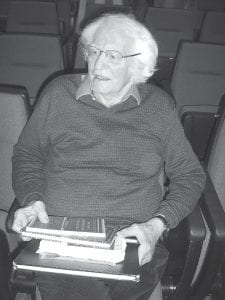Robert Bly, renowned poet and leader of an American’s men’s movement, gave a poetry reading at the Arrowhead Center for the Arts May 5, 2010. A Minnesota native, Bly read from his early works, which contemplated midwestern farm life, from his Viet Nam-era works, which promoted social consciousness and activism, and from more recent works, showing his progression through various life stages. Speaking in short, poetic bursts of thought, he answered audience questions and encouraged would-be writers.

“All the sailors on deck have been blind for many years. … All the sailors on deck have been blind for many years.”
Such were the words of poet Robert Bly May 5, 2010 at the Arrowhead Center for the Arts. He read and recited poems he has written over the course of his life, repeating many of his phrases, reading most poems twice, making funny remarks in between poems, remarks that were so poetic in and of themselves that it was hard to tell between one and the other.
Bly began with some of the “country poems” he wrote when he was young, “little poems” about life on the farm. “You either like them or you don’t,” he said. “You see a few sticks in the ground, and you write a poem about it. People think it’s deep!”
Bly especially loved to see lights in barns. He didn’t care so much about lights in houses, it was lights in barns that spoke to him.
“…I came in and found the moonlight lying on the floor. …I came in and found the moonlight lying on the floor.”
About his early poems, Bly said, “Some of them I like, some I don’t.”
Some of Bly’s poems were angry and disturbing, like one about the Viet Nam War. “I’m past the age of trying to cheer you up,” he said. Bly is 83 years old.
After reading one poem, he said, “I like it. I don’t care if you do.” The audience laughed.
“Do I have a right to my poems?” he asked. “To my jokes? To my loves?”
Bly’s images were so strong that it was almost easy to repeat each poem with him as he read it the second time around.
“Some little bone in my foot is longing for heaven. … Some little bone in my foot is longing for heaven.”
A young person in the audience asked Bly for advice about writing in meter as required by a class in school. He told her to forget about meter. “It’s for old men,” he said. “Writing in meter is like trying to get a one-legged man to dance.” Later, he read some of his own poems that follow a form called ghazal
that came out of the near East.
To encourage would-be poets, Bly said simply, “Write and clap for yourself. …There’s nothing sweeter than writing for yourself.” He entreated people to avoid judging their poetry. “The poet and the judge are two separate people,” he said. “Write every day if you can, and don’t stop once you get started.”
One audience member asked a question that referred to his role as leader of “the expressive men’s movement” that swept the country, bringing men together to share their experience of the world. “What advice do you have for men?” was the question.
“Run naked down the road,” was the answer. Bly’s answers and advice were clipped, like poetry. Men don’t admit their defects to one another, he said before moving on to the next idea.
One person asked if good poetry could do anything but tell the truth or if the poignancy of the truth was, rather, a hallmark of good poetry. Good poetry points out truth, he answered. “I think writers get more honest as they get older,” he said. “We all have a tendency to lie; it’s built into us.” We have to learn to discern the truth from the lies, he said.
“Don’t give up hope that the door of mercy may still be open. …Don’t give up hope that the door of mercy may still be open.”
Robert Bly is an old friend of Bill
Duffy, long-time Cook County
High School English teacher
and poet. His poetry reading
was organized by the Grand
Marais Public Library and
funded by proceeds from the
2008 Minnesota Legacy Act.


Loading Comments